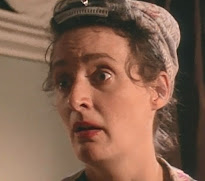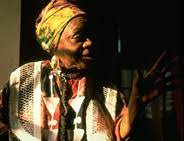The problem with the tale?
Why is the stepmother so mean?
Historically, the stepmother's motivation for meanness is simple: limited resources equals limited opportunities. Cinderella is one more mouth to feed.
Branagh's stepmother wanted more out of life and sees Cinderella as someone to blame--or someone to envy.
In Ashpet: An American Cinderella, the stepmother is overwhelmed and tired of her demanding daughters. At one point, the oldest obnoxious daughter says, "Don't you want me to get married, Mama?" Her mother gives her a blank look that speaks volumes.
 |
| Stepmother played by Nancy Robinette |
Later, when the "prince"--World War II GI about to depart for the boat--comes to visit with the lost shoe, he asks, "Do you have a daughter?"
"Yes!" the mother exclaims. "Yes, I do!"The subtext: Please, get them out of the house.
In fact, the stepmother's reactions remind me of the fantastic poem by Vivian Vande Velde (below).
Over all, Ashpet is quite a worthy rendition of Cinderella, despite my general distaste for the story. It works because it is so normal. The stepsisters are obnoxious--but Ashpet is housed and fed. The stepmother lets her daughters walk all over her. She isn't actively cruel.

Regarding the protagonists, the fairy godmother, Dark Sally played by Louise Anderson, knows the secret of the house, specifically where the mother of Ashpet (Lily) hid her fine clothes and jewels. The young man at the dance is thoroughly sweet and good-natured. And he tries to simply return the shoe, not try it on every young woman's foot. Ashpet comes out of the kitchen while her stepsisters are arguing, and he is relieved to see her.
Very low key. Very everyday. Very nice.
Evidence
If the coach turned back into a pumpkin
and the footman into mice,
one can only wonder
why the glass slippers alone remained
untouched by magic's ebbing tide.
Obviously a set-up.
But by whom?
The fairy godmother's ability
didn't extend beyond midnight.
And where would a cinder girl
have ever gotten shoes like that?
Could they possibly have been a secret gift
from the stepmother,
eager to get her out of the house,
tired of her unrelenting goodness,
and beauty,
and cheerfulness
(not to mention all that singing)?


No comments:
Post a Comment